Anyone who collects British Airways Avios is familiar with the high costs of redeeming points with British Airways. Not only are you stuck with hefty carrier-imposed surcharges, but also the Air Passenger Duty (APD) on departures out of the UK.
More advanced Avios users know that the best-value redemptions often lie in short-haul flights on Oneworld airlines, thanks to the program’s unique distance-based award chart. There are also pockets of value in certain long-haul economy class flights, and even a handful of compelling redemptions for long-haul business class flights, especially on Qatar Airways Qsuites.
But the truly savvy Avios collectors will know that there’s actually an entirely separate award chart within the program, which is used specifically when multiple Oneworld partner airlines are combined on the same itinerary. The chart is titled “Avios costs for multi-carrier Reward Flights”, but is more commonly referred to as the multi-carrier award chart, and represents one of the most powerful uses of Avios.
In This Post
The Multi-Carrier Award Chart
To begin, here’s the chart itself, as displayed on the British Airways website:

These prices reflect a booking that’s done in economy class, and you multiply the Avios prices by 1.5x for premium economy, 2x for business, and 3x for First Class.
Taking this into account, a more complete chart is presented as below:
Miles in your journey | Avios required for... | |||
Economy | Premium economy | Business | First | |
0–1,500 | 30,000 | 45,000 | 60,000 | 90,000 |
1,501–4,000 | 35,000 | 52,500 | 70,000 | 105,000 |
4,001–9,000 | 60,000 | 90,000 | 120,000 | 180,000 |
9,001–10,000 | 70,000 | 105,000 | 140,000 | 210,000 |
10,001–14,000 | 90,000 | 135,000 | 180,000 | 270,000 |
14,001–20,000 | 100,000 | 150,000 | 200,000 | 300,000 |
20,001–25,000 | 120,000 | 180,000 | 240,000 | 360,000 |
25,001–35,000 | 140,000 | 210,000 | 280,000 | 420,000 |
35,001–50,000 | 160,000 | 240,000 | 320,000 | 480,000 |
The Rules
To begin, let’s go over the ground rules of using the British Airways Avios multi-carrier award chart:
-
You must include at least two Oneworld airlines besides British Airways on your ticket
-
Travel can only take place on Oneworld airlines, so British Airways’s non-Oneworld partners, such as Aer Lingus, are not eligible
-
-
You can have at most eight flight segments, and travel must take place within a 12-month window; this means that you’re effectively allowed seven stopovers on the ticket
-
In addition, you can also have one open-jaw
-
Reasonable backtracking within an IATA zone is allowed
-
Your routing must follow a logical sequence; however, the definition of what is logical and what isn’t is up to British Airways
-
The total distance of your trip, which is used to determine the Avios cost according to the above multi-carrier chart, is based on the cumulative distance of your flown segments
-
This is contrast to regular British Airways Avios awards, which are based on adding up the individual award costs of each segment
-

The last rule is very nuanced but a very important one to understand. When booking “normal” Avios awards with more than one segment, you look up each segment’s award cost first, then add them up to arrive at a total.
In contrast, when using the multi-carrier award chart, you add up each segment’s distance first, then look up the total distance in the chart.
This means that if you’re booking multiple long-haul segments in a single itinerary, you’d achieve substantial savings by using the multi-carrier chart instead of the regular award chart, as you’ll see in the examples below.
Beyond that, there aren’t many other rules. There’s no maximum permitted mileage (MPM) restriction or anything like that, because after all, the more you fly, the more Avios you’ll pay.
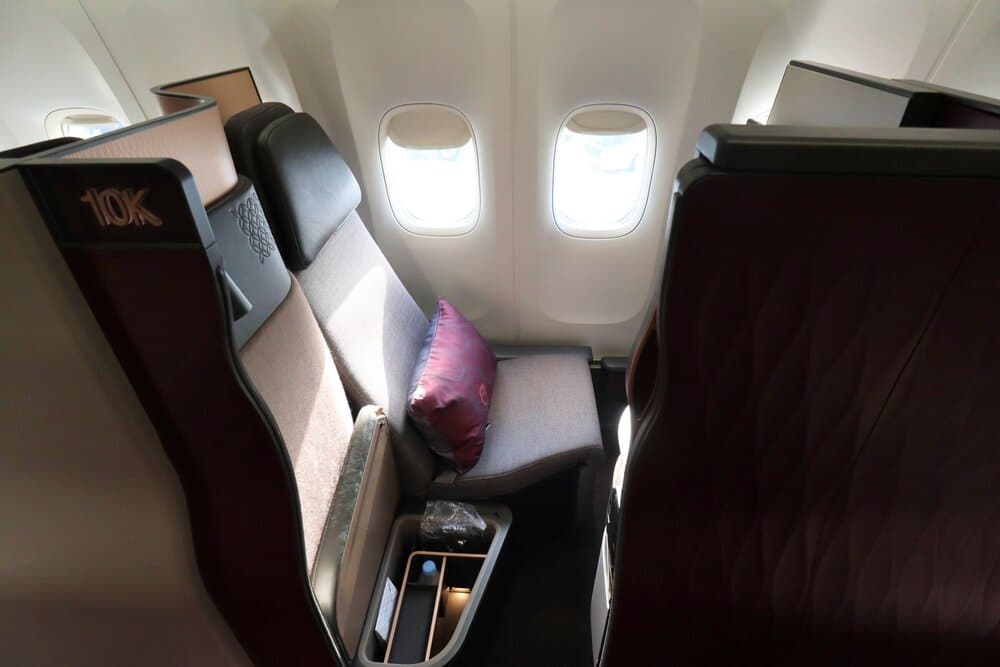
A Few Examples
Let’s run through a couple of quick hypothetical examples of potential trips you could book using the Avios multi-carrier chart, before diving into the nitty-gritty side of stretching this redemption sweet spot to its most extreme limits.
1. Oneworld, Around the World
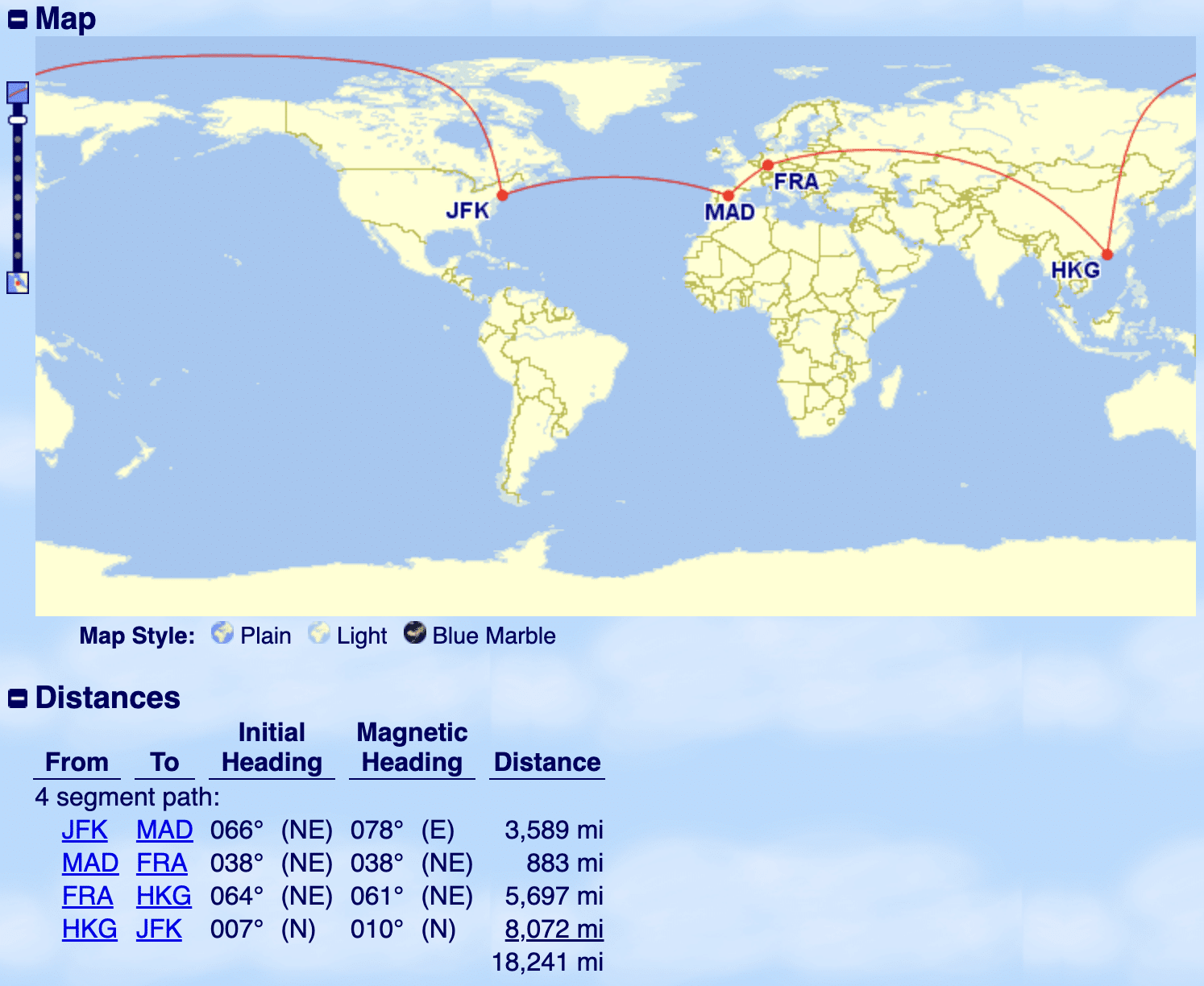
Let’s start with a simple round-the-world ticket that gets you to Europe and Asia.
Beginning in JFK, this routing first brings us to Frankfurt via Madrid on Iberia. Then it’s Cathay Pacific to Hong Kong, and then Cathay Pacific again all the way back to JFK.
The total distance is under 20,000 miles, so this would be 100,000 Avios at the economy class level or 200,000 Avios at the business class level.
2. Qsuites + Sky Suites
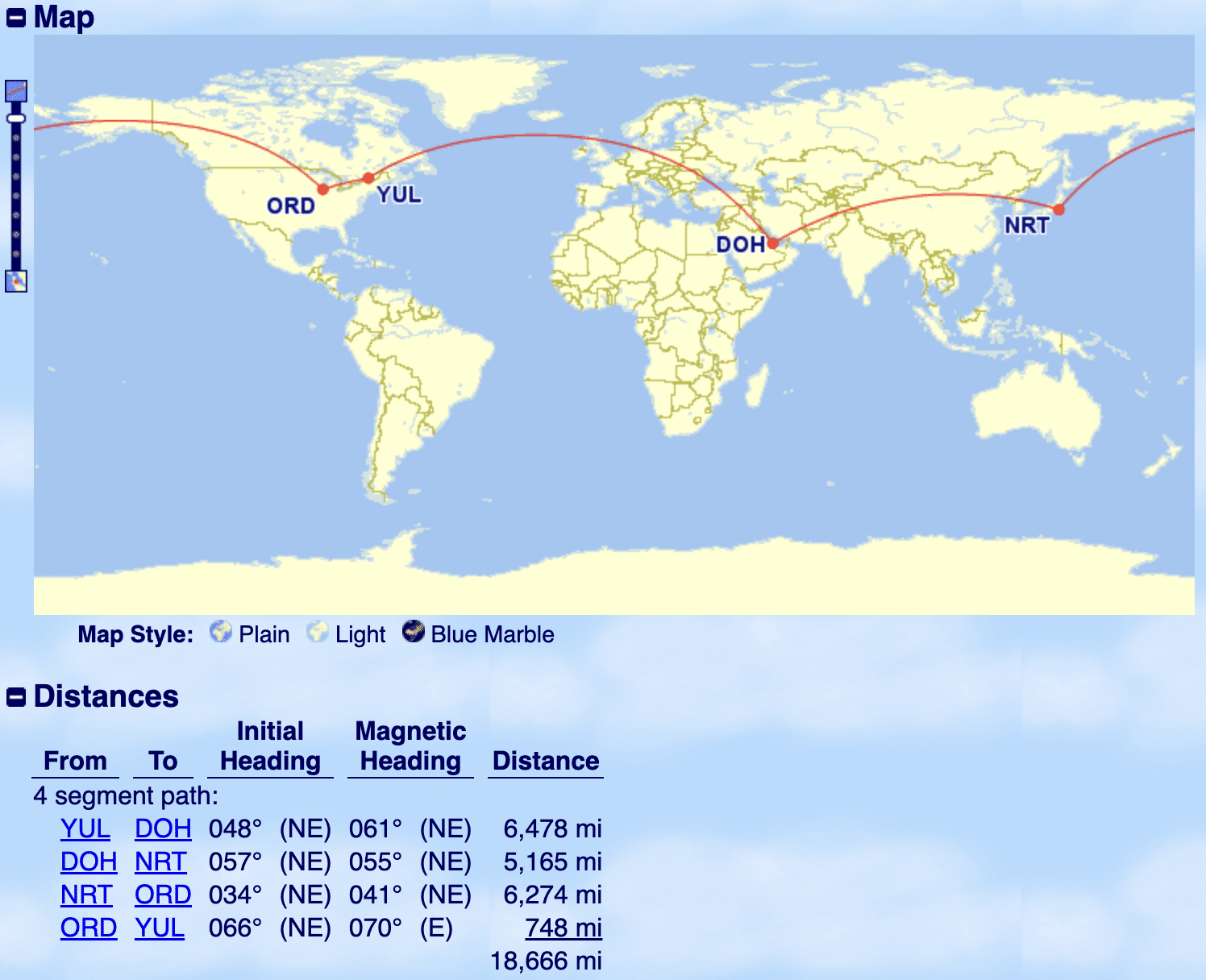
Starting in Montreal, take the Qatar Airways flight to Doha, before continuing on the same airline to Tokyo. From Tokyo, fly Japan Airlines to Chicago, and then back to Montreal on American Airlines.
The distance clocks in under 20,000 flown miles, so this would be the same pricing as above, and would be a great way to try out Qatar Airways Qsuites and Japan Airlines Sky Suites product on one epic trip.
3. Open-Jaw-stralia
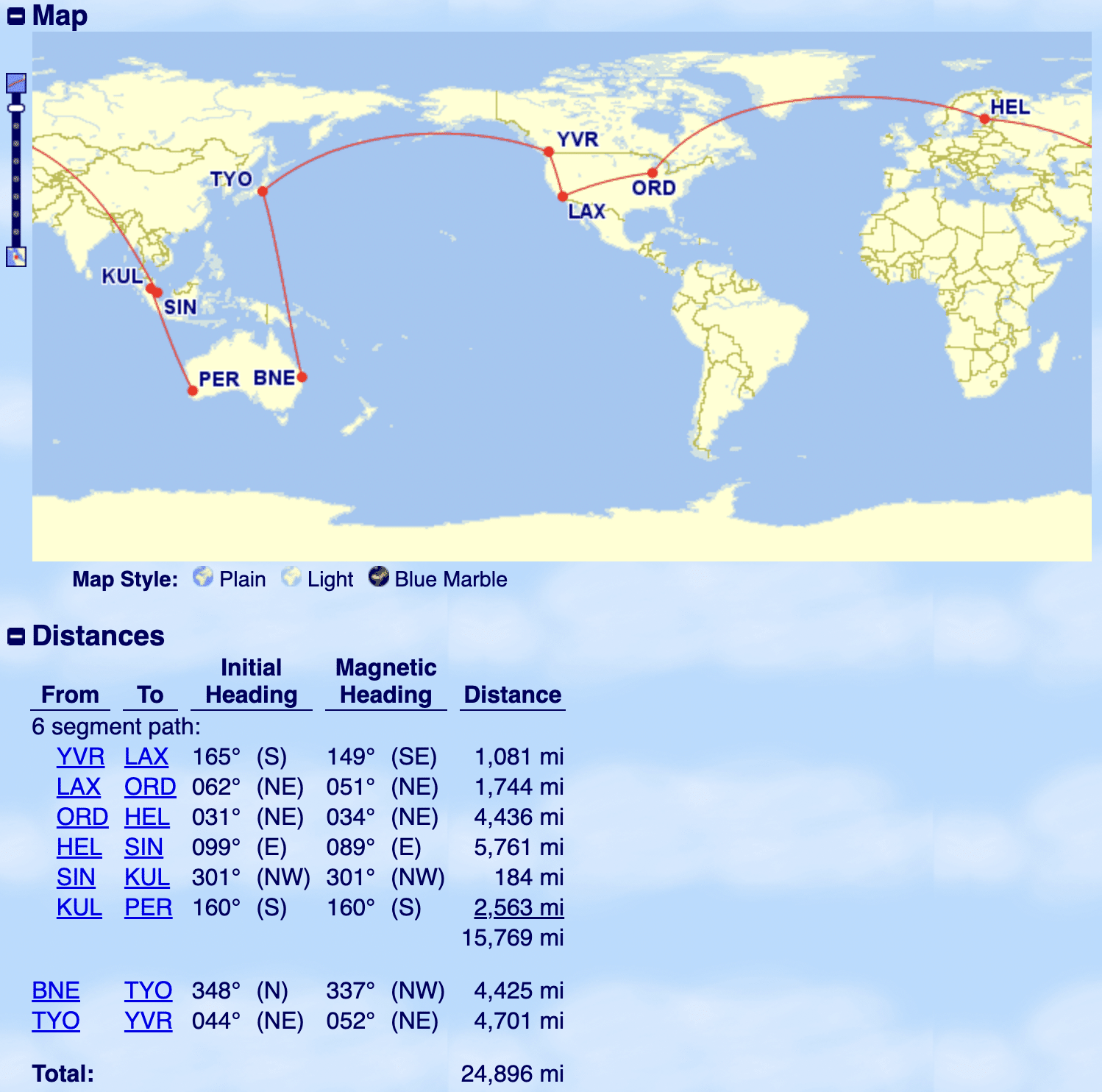
A Vancouver-based traveller could hit up Los Angeles and Chicago on American Airlines before taking Finnair to Helsinki and then beyond to Singapore. From there, Malaysian Airlines brings us down to Perth by way of Kuala Lumpur.
After an intra-Australia open-jaw, we’d depart Brisbane on Qantas to Tokyo, followed by a Japan Airlines flight back to Vancouver, taking advantage of the co-terminal airports.
This routing maximizes our allowance of eight flown segments and one open-jaw, and since the flown distance is just under 25,000 miles, you’d pay 120,000 Avios at the economy class level or 240,000 Avios at the business class level.
To illustrate where the power of the multi-carrier award chart lies, take a moment to imagine if we were to book these eight flights the “normal” way using Avios instead. Helsinki to Singapore alone in business class would cost 92,750 Avios, and that’s just one flight out of eight.
Indeed, if we were to tally it up, we’d find that it would cost a whopping 399,000 Avios to book all eight segments separately! This means that we’re incurring a pretty hefty savings of 159,000 Avios by choosing to use the multi-carrier chart instead.
Of course, the problem is that 240,000 Avios is still a huge amount of points to redeem all at once, so let’s start looking at how we can optimize further…
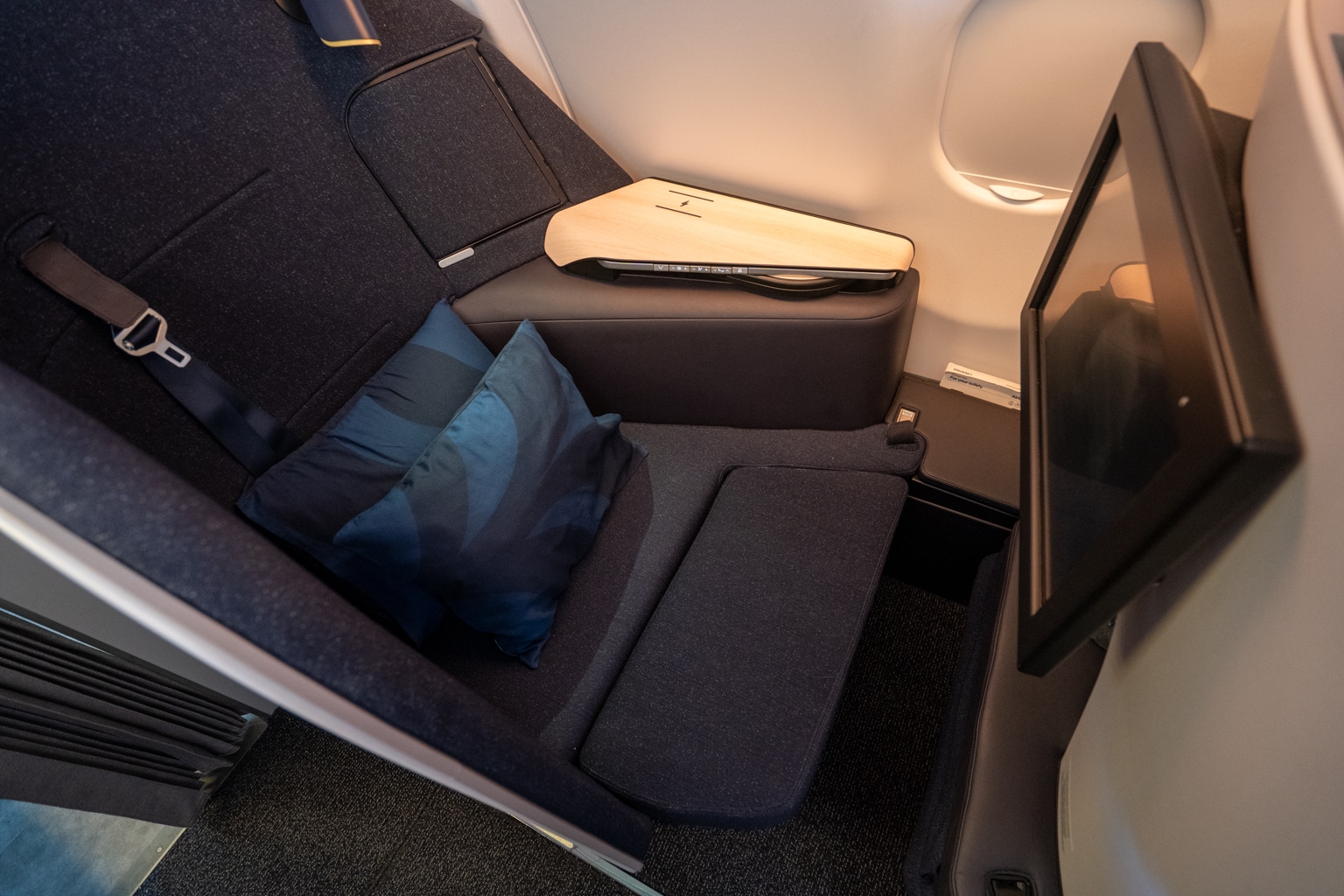
Optimizing the Avios Multi-Carrier Chart
There are several angles you could take to optimize the multi-carrier chart, which can stretch your points even further.
Staying Under the Threshold
Similar in principle to the “normal” Avios chart, the multi-carrier chart is composed of several different award pricing levels based on the total distance flown. You therefore maximize your value at a certain redemption level by getting as close to the threshold of flown miles as possible, without going over it.
Play around with the Great Circle Mapper as you plan out your routes. You’ll be shooting for the mileage thresholds of 14,000 miles, 20,000 miles, 25,000 miles, etc. for the total distance.
Keep in mind that the open-jaw distance does not contribute to this number – in Example #3 above, we would’ve overshot the 25,000-mile threshold if we’d resumed our journey from Sydney or Melbourne, but by choosing Brisbane, we remained just under.
Leverage Transfer Bonuses
In Canada and the United States, there are occasional transfer bonuses from transferrable points currencies, such as American Express Membership Rewards, RBC Avion, HSBC Rewards, Amex US Membership Rewards, Chase Ultimate Rewards, and Capital One, to British Airways Avios.
Typically, the transfer bonus is 30%, but it has also been as high as 50% on rare occasions.
Since these bonuses come around pretty reliably, you can even think of the prices on the multi-carrier award chart in terms of a reduced number of points, resulting in prices as follows:
Miles in your journey | With 30% bonus, Amex MR points or RBC Avion points required for... | |||
Economy | Premium economy | Business | First | |
0–1,500 | 23,077 | 34,615 | 46,154 | 69,231 |
1,501–4,000 | 26,923 | 40,385 | 53,846 | 80,769 |
4,001–9,000 | 46,154 | 69,231 | 92,308 | 138,462 |
9,001–10,000 | 53,846 | 80,769 | 107,692 | 161,538 |
10,001–14,000 | 69,231 | 103,846 | 138,462 | 207,692 |
14,001–20,000 | 76,923 | 115,385 | 153,846 | 230,769 |
20,001–25,000 | 92,308 | 138,462 | 184,615 | 276,923 |
25,001–35,000 | 107,692 | 161,538 | 215,385 | 323,077 |
35,001–50,000 | 123,077 | 184,615 | 246,154 | 369,231 |
At those price points, you suddenly see how the British Airways Oneworld round-the-world trip might potentially be viewed as one of the most compelling uses of your points.
Indeed, we see that 153,846 Amex MR points would get you 200,000 Avios during a 30% bonus, or just 133,333 RBC Avion or Amex MR points during a 50% bonus.
That would allow you to take a very swanky round-the-world trip on Oneworld’s best carriers, and you’d get the luxury of seven stopovers over a 12-month period! If you’ve ever had your eye on a round-the-world trip, be sure to pad your Avios balance before you’re ready to book.
Taxes & Fees
Because these redemptions are relatively rare in the Miles & Points scene, it’s hard to get an understanding of the exact amount of taxes and fees that you pay on these Avios multi-carrier award tickets.
As a rough estimate, you can always use ITA Matrix to look up a fare breakdown for every flight you plan on taking, and then add up the amounts of the airport taxes and fuel surcharges. However, this method doesn’t always correspond to what gets calculated for the overall journey.
From some reports, expect to pay at least $400–500 (CAD) per ticket for an extensive round-the-world trip departing from North America. If you have many stops along the way, expect the total to come to over $1,000 (CAD).
While this is certainly more than what you might pay on, say, a multi-stop Aeroplan redemption, it still pales in comparison to cash fares for a similar journey or even a single flight in business class, for that matter.
However, if you were to originate your trip in a country that has regulated fuel surcharges, such as New Zealand or Brazil, you’d end up paying minimal fuel surcharges. One idea could be to “nest” an Avios multi-carrier award departing from Oceania into the middle of a bigger trip, to give you two trips down under and allow you to avoid the bulk of fuel surcharges on all the flights.
And as always, keep in mind the usual money-saving tips on government-imposed taxes, such as avoiding the UK’s punitive Air Passenger Duty (APD) by flying into a nearby city and taking the train or a budget airline instead.
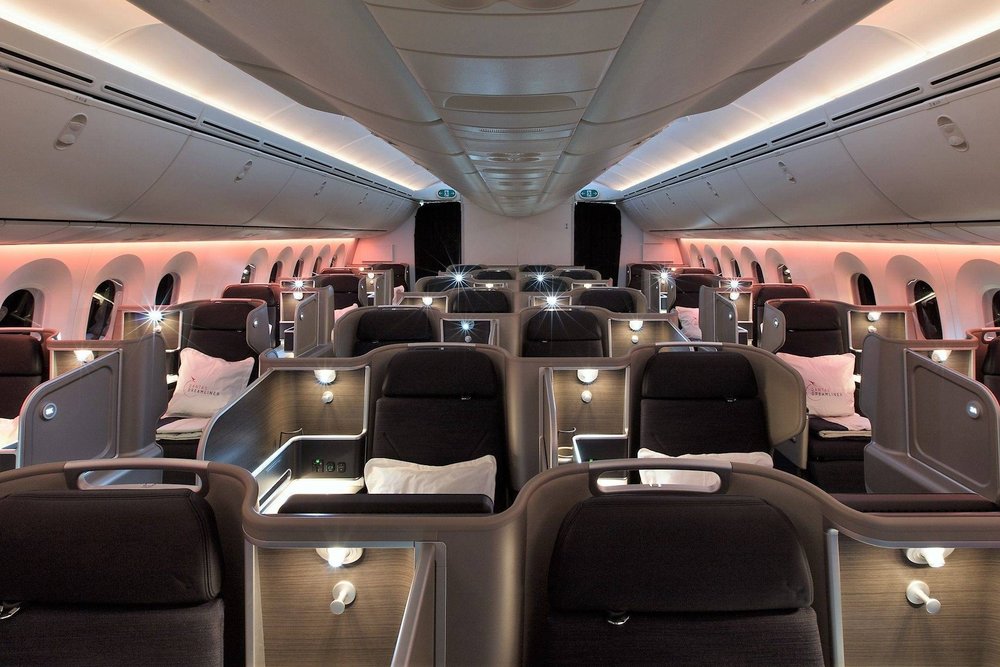
How Is the Class of Service Determined?
Now here’s something very interesting about the Avios multi-carrier award.
With most loyalty programs, you get charged based on the highest class of service among all the flights in your itinerary. So, if you had seven segments in economy class and one in First Class, you’d get charged the First Class pricing for the whole thing.
Some other programs might treat mixed-cabin itineraries a little differently: they’ll pro-rate the mileage cost based on the specific cabins you’re flying. So if you had a mix of business and economy, your mileage price would fall somewhere in the middle.
With the Avios multi-carrier award chart, some data points suggest that the class of service is assessed based on your longest segment only. So, if you were to perhaps fly two short segments in First Class and one long segment in business class, you might be surprised with what the cost works out to be.
Extending this any further is left as a very worthwhile exercise to the reader.
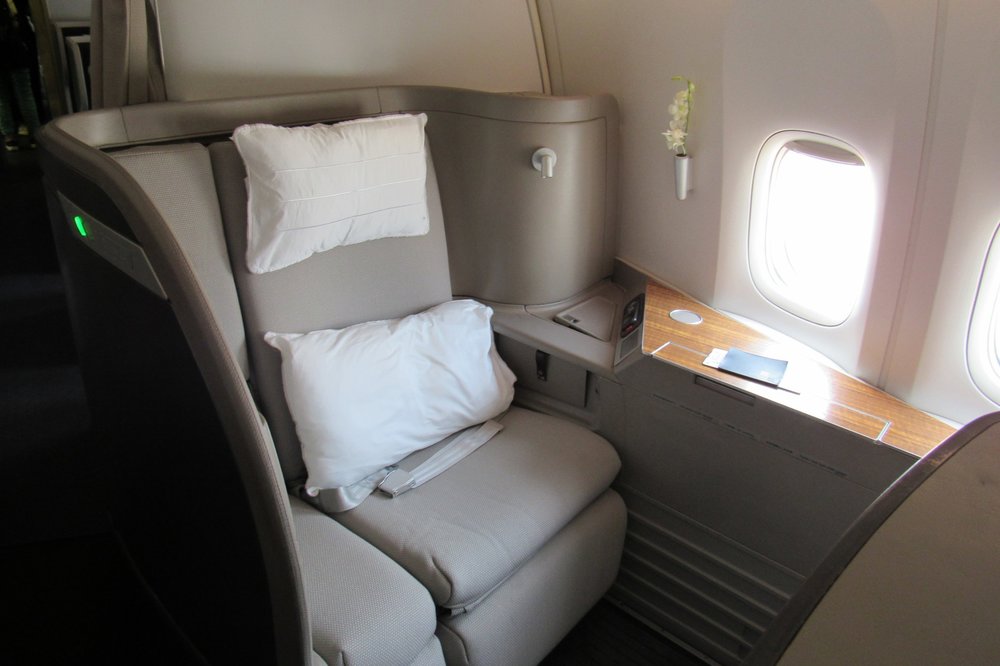
How to Search and Book
You’d go about booking one of these British Airways Avios multi-carrier awards in the exact same way as any other complex award.
First, you’d plan a route that follows all the rules – having a working knowledge of which Oneworld airlines fly which routes will be immensely helpful, so be sure to play around with FlightConnections if you need some assistance.
Then, you’ll have to search for availability on all these flights. ExpertFlyer can be helpful for this purpose, but it actually lacks the ability to look up award space on several Oneworld member airlines, like Cathay Pacific, Japan Airlines, or Qatar Airways.
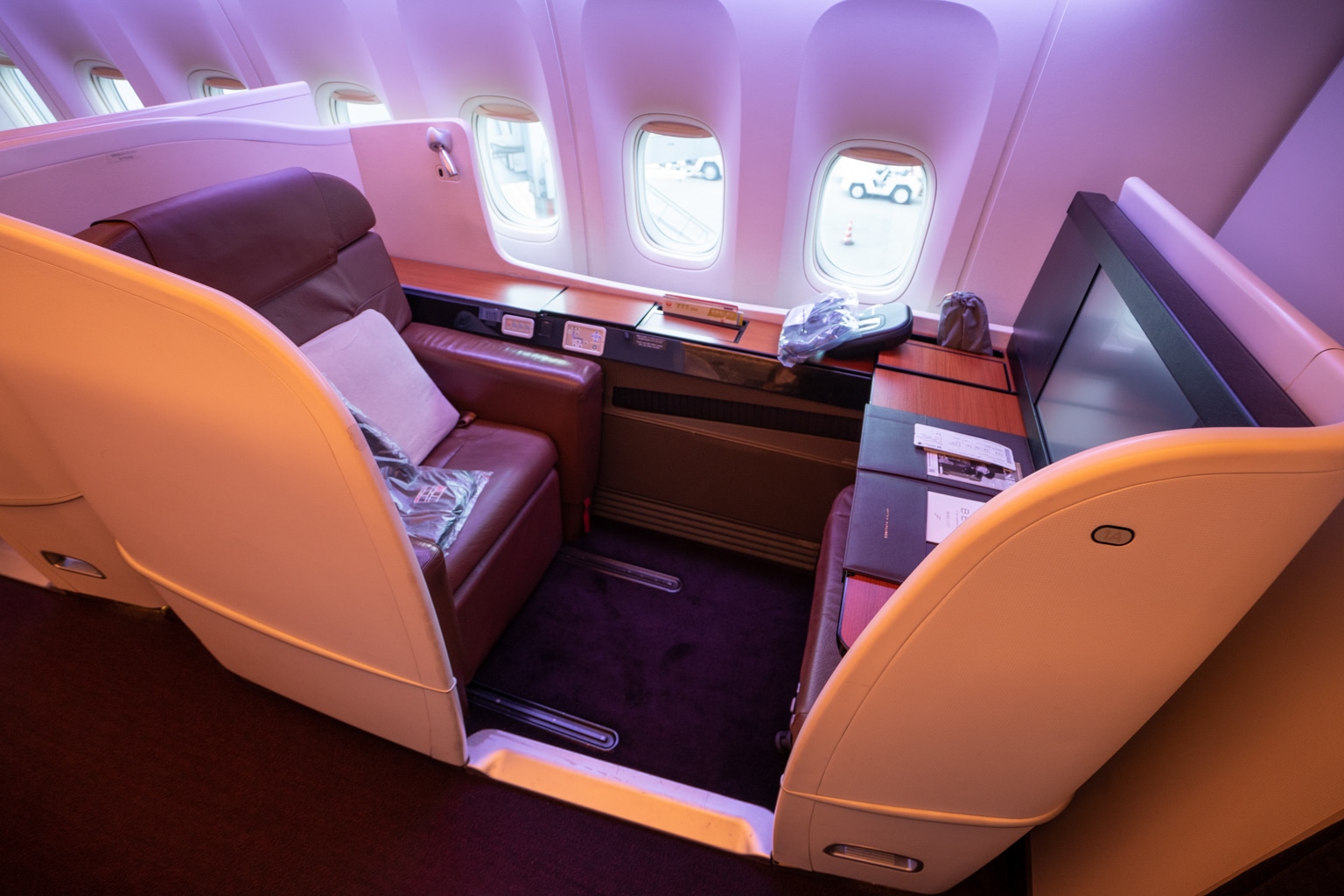
Alternatively, consider using a different paid service, such as AwardLogic. However, the easiest ways to find award space using the American Airlines, Alaska Airlines, or Qantas websites, which all have calendar views.
After you’ve planned your desired routing and found award space on all the flights, you’ll have to call British Airways Executive Club to book, since there’s no way to book these awards online. Since this is a rather obscure award chart, some agents might be unfamiliar with it, so you may have to call a few times before you find an agent who can book it for you.
Once they’ve found all of the flights, your booking will be shipped off to another department for a quote on the taxes and fees. You’ll receive an email a short while later with the quote, and then you’ll have to call back in again to complete the payment.
Conclusion
The multi-carrier award chart is a relatively “hidden” redemption opportunity that only a fraction of British Airways Avios collectors will ever find out about. It can be an excellent sweet spot, if used in the right circumstances, to build an exciting round-the-world trip.
If you’re able to leverage any of the 30–50% transfer bonuses to Avios, the cost reduces dramatically. And if you happen to get lucky with the class of service, you might just have scored a real bargain.
Not many people have booked Avios multi-carrier awards, and the only way to tease out the juiciest parts of this sweet spot is by trying out a few bookings for yourself.










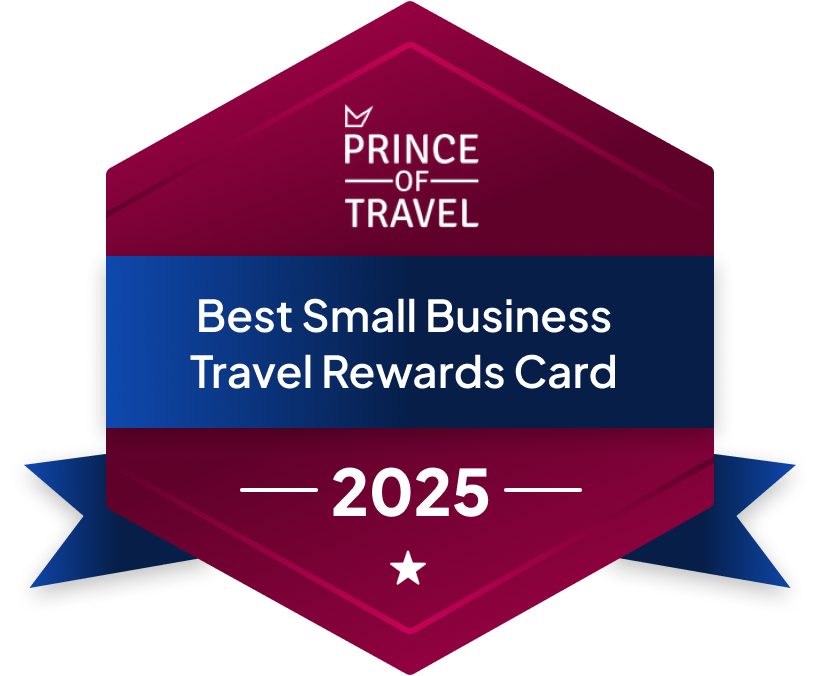


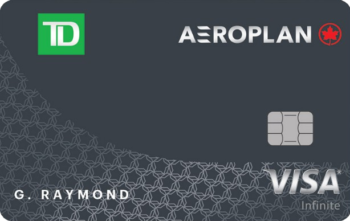






ricky can i start in europe and end in canada or do i have to fly out of the same airport as the one i return to. do all the flights have to be direct? fco-jnb (4784 mi) includes a 3 hr layover in doh on qatar + jnb-hkt (5256 mi) with a 1-3 hr stop in hkg or doh with cathay or qatar + hkt-ywg (8328 mi) with 2 stops in hkg& yyz on cathay+westjet = 18368 miles. have i followed all the rules?
Is availability based on the regular BA award chart? Or based upon each participants award chart. ie Japan air on the Japan air chart or the Japan Air availability on BA?
Then this is changed by the executive club customer service to the new chart?
This value and entire article is based off speculation from one data point. There is going to be a LOT of time wasted figuring out itineraries if it proves not be true. If it is true it’s a game changer but I for one am not going to waste significant time figuring out a flight plan only to call in and have it be a million points for two. I also imagine if it did work this way that they would close that loophole ASAP.